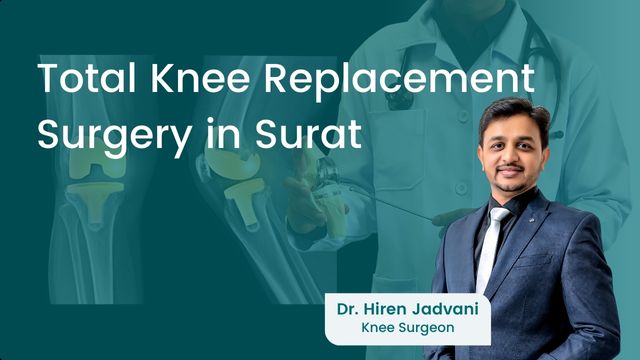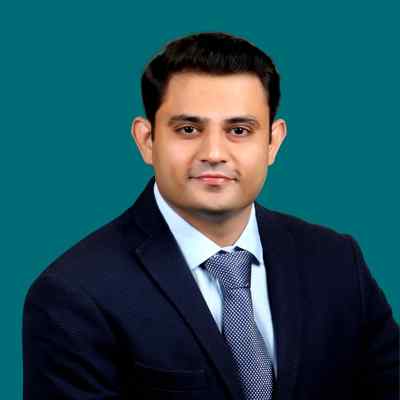Nidhanam orthopedics Center is the best hospital in Surat to provide Total Knee Replacement Surgery. Dr. Hiren Jadvani is the best knee surgeon of Surat, has more than 10 years of experience in performing total knee replacement surgery.
If your knee is significantly damaged due to arthritis or injury, you may find it difficult to do simple activities like walking or climbing stairs. You may even have pain while sitting or lying down.
If nonsurgical treatments, such as drugs and walking aids, are no longer effective, you may wish to consider total knee replacement surgery. Joint replacement surgery is a safe and successful technique for relieving pain, correcting leg deformity, and allowing you to return to normal activities.
Osteoarthritis: This is an age-related wear and tear type of arthritis. It usually occurs in people 50 years of age and older, but may occur in younger people, too. The cartilage that cushions the bones of the knee softens and wears away. The bones then rub against one another, causing knee pain and stiffness.
Rheumatoid arthritis: This is a disease in which the synovial membrane that surrounds the joint becomes inflamed and thickened. This chronic inflammation can damage the cartilage and eventually cause cartilage loss, pain, and stiffness. Rheumatoid arthritis is the most common form of a group of disorders termed “inflammatory arthritis.”
Posttraumatic arthritis: This can follow a serious knee injury. Fractures of the bones surrounding the knee or tears of the knee ligaments may damage the articular cartilage over time, causing knee pain and limiting knee function.
Total Knee Replacement Surgery is done in above cases where conservative or medical management has been failed to relieve symptoms. It is also useful in case of deformity corrections.
The following are the clinical goals of a Total Knee Replacement(TKR) procedure:
- To put the implants in a correct alignment and position
- To ensure that the remaining soft tissues are balanced
- To ensure that the implant is well fixed to the bone
- To ensure that the implant used is designed to offer high level of function & longevity
The above clinical goals translate to the following qualitative goals from a patient standpoint
- To relieve pain
- To restore function
- To last as long as possible
There are three main types of surgery for a knee replacement:
Total Knee Replacement: A TKR replaces both sides of the joint with metal parts and plastic surfaces to create a smooth surface for more natural-feeling movement.
Partial Knee Replacement: A PKR replaces just one side of the joint with metal parts and plastic surfaces to create a smoother surface for better movement in one direction.
Resurfacing: A resurfacing replaces only the non-weight bearing surfaces of the joint with metal and plastic parts to provide a smoother surface for better movement in one direction.
Surgery requires 60 to 90 minutes. And post op care is given for 2 to 3 days at hospital. Total Knee Replacement surgery is very safe and common procedure with majority of patients get immediate relief from symptoms.
When can you start walking after total knee replacement surgery?
Daily work and walking can be started within 3 to 6 weeks post total knee replacement surgery. At Nidhanam, we provide complete rehabilitation care with physiotherapy & diet support to achieve full mobility.
How long the implants of total knee replacement will last?
Currently, more than 90% of modern total knee replacements are still functioning well 15 years after the surgery. Following your orthopaedic surgeon’s instructions after surgery and taking care to protect your knee replacement and your general health are important ways you can contribute to the final success of your surgery.
Nidhanam orthopedics Center is the best hospital in Surat to provide Total Knee Replacement Surgery. Dr. Hiren Jadvani is the best knee surgeon of Surat, has more than 10 years of experience in performing total knee replacement surgery.
Surgery cost depends upon unilateral or bilateral replacement requirement and also type or manufacturer of replacement. To know more about cost of total knee replacement surgery, book consultation with Dr. Hiren Jadvani.
Expert Doctors
Frequently Asked Questions
Arthroscopic surgery is a type of minimally invasive surgery that requires only small incisions thanks to a device known as an arthroscope. It lets your surgeon see inside the joints and view the specific area being worked on during surgery without the need for large incisions.
Arthroplasty is the reconstruction or replacement of a joint such as a shoulder, elbow, wrist, hip, knee or ankle. Depending on the extent of the joint injury or condition, you may need partial or total arthroplasty.
Like human bone, the prosthetic devices used in joint replacement surgery can become damaged or simply wear out. If you’ve previously had partial or total joint replacement surgery but need to have the joint operated on again, it’s considered revision surgery.
Advances in medical technologies — including the prosthetic materials used in total and partial hip, knee, elbow and shoulder joints — continue to extend the life expectancy of artificial joints. Generally speaking, today’s prosthetic devices can last upwards of 15-20 years. Factors that can impact the durability of prosthetics include your activity level, overall health, weight and whether you have arthritis.
While the goal of surgery is to restore function and get you moving without pain, there are usually some limitations after orthopedic surgery. Talk to your orthopedic surgeon about realistic expectations after surgery.
There’s no one-size-fits-all answer for deciding when to have surgery. Your orthopedic surgeon or other doctors will help you determine when surgery is the most appropriate next step. Key considerations include whether you’re in pain, if you’re experiencing instability or decreased mobility, and whether the injury or condition is affecting your quality of life.
For first consult, patient will be evaluated with detailed history and clinical examination before he/she is advised suitable imaging. Additionally, it will be helpful to bring along previous X-rays and scans especially related to fractures and for comparative assessment.
A fracture is a broken bone. A sprain occurs when you injure the ligaments that connect your bones.
For most of the patients, average stay after surgery is between 2-5 days, depending on the type of surgery. Discharge is planned when medical condition is stable, pain is adequately controlled with oral medications, able to eat and urinate and when physical and occupational goals are successfully met. Bracing, rehabilitation and after surgery instructions will be provided to the patient at discharge.
Following discharge after surgery, you are required to contact the physiotherapist who will help in optimum post-operative recovery. At Nidhanam Orthopedics Speciality Center we have consultant physiotherapist and rehab expert in our team of doctors to ensure smooth rehabilitation and recovery.






